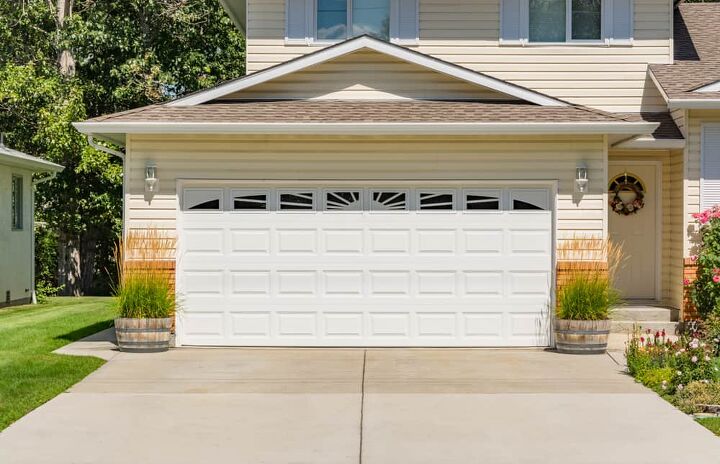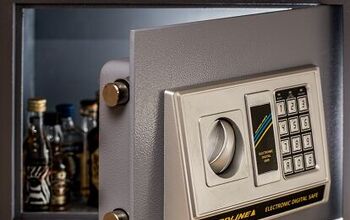6 Garage Door Hinge Types

Garage doors are one of those things that people often neglect to think about until they actually have to repair them. It’s understandable, even if it’s not the best thing for a homeowner to look into. This is especially true about the tiny little details that come with garage doors, like the hinges. If you’re like me, you didn’t realize there were even different hinge types until fairly recently…
There are several different ways to categorize garage door hinges, and each category has its own factors that can change the overall outcome of your hinge installation. The most important ones to keep in mind include:
- Commercial/Residential
- Numbered
- Gauge
- Truck Door Hinges
- Anti-Pinch
Garage Door Only Opens A Few Inches? Though the cause may not always be a faulty hinge, getting the right type of door hinge is a must, especially if you want to make sure your door doesn’t break during use. Our guide will make sure that you get the right ones.
Garage Door Hinge Types: How To Order The Right Ones
It’s important to realize that there are literally multiple types of hinges that can all be considered identical by other categories. In other words, it’s possible to find residential number 1 hinges alongside commercial ones. And it’s possible to find some low gauge residential along with commercial low gauge hinges.
Confused? I was at first, too. It’s often better to explain each way people categorize garage doors to give you a good
Commercial vs. Residential Hinges
This is a toughie to explain, but we’re going to keep it simple. Commercial garage doors are larger and heavier than the ones you’ll find on your neighborhood’s streets. Therefore, they tend to be more reinforced. The structures of residential versus commercial doors are also different.
Not sure what to use? Don’t panic. It’s easy to tell apart these two types. Residential hinges will have numbers that display exactly where you should use them, while commercial hinges often won’t.
Garage Door Hinge Numbers
If you have a residential garage door (or a multi-use door hinge), you might have noticed a number stamped on the leaf of the hinge. Residential hinges will have numbers that range from #1 to #5, while commercial doors will be labeled between #6 through #11.
These correspond to the joints that they are allowed to be used on. Here’s what you need to know:
- Garage door hinge numbers deal with the places where you’re meant to use them. For example, #1 hinges are meant to be used between the first and second joints. They’re usually the only ones that are single sleeve. #2 joints tend to be used between the third and second. Then, #3 hinges go between the third and fourth. With commercial doors, the pattern is the same, but #6’s go where #1s go.
- You can also refer to the garage door manual to figure out what you should use. Most garage door manufacturers and guides will have a chart that you can refer to for your particular door.
- Be aware that some commercial doors can use residential door numbers for their joints. You can usually match it up pretty easily. Just use common sense.
- #1 hinges are just meant for the part that connects two door sections together. Meanwhile, gauges labeled 2 through 11 are meant to support the roller. Hinges that support rollers are called “end hinges.”
- Whenever you are feeling a little lost, ask someone who works in the hardware store or works as a hinge installer. You can get a lot of advice from them.
Gauge
Gauge refers to the thickness of the garage door hinge, and it’s a major factor in how well a thing will work for you. The lower the gauge ratin, the thicker the hinge will be. This means that most commercial garage door hinges will have a gauge rating that’s 14 or lower. Meanwhile, residential areas will have a gauge rating of 14 through 18 in most situations. With that said, there’s more to know about gauges than just that…
- You will see several standard measurements as far as gauges go. The most common are 11, 14, and 18. Sometimes, you might see a 16-gauge door, but it’s rare.
- Most standard residential garage doors will need a 14-gauge hinge. If you aren’t sure, it’s okay to ask a handyman for hints or to check other hinges on your door.
- You can use lower gauges on a door that requires higher gauges, but not the other way around. Be forewarned, if you do this, you might notice that the door hinge will have a little looseness. If you try to use a higher gauge on a low-gauge door, you will probably end up with a broken hinge.
- Sometimes, you might hear different gauges referred to by different names. For example, an 18-gauge hinge might be called a “narrow leaf.” This is totally normal, but they are still one and the same.
Truck Door Hinges
Because they are meant for a much larger, bulkier and more secure door, truck door hinges are in a category all their own. These usually come sold in kits, and are made by the number of panels that the garage door has. These tend to be made with an extraordinarily high reinforcement grade, and also tend to be far heavier than typical hinges would be.
If you need a new truck garage door hinge, you will most likely need to buy a hinge kit that is made specifically for your door model. With that said, you might be able to get a universal-fit truck kit. If you have a commercial truck door that is custom-made or has lots of panels (like the one above), you may need to call the manufacturer to get replacement parts.
Anti-Pinch
Technically, this isn’t a type, but rather, a feature of many different kinds of garage doors that tends to be so big a deal, people tend to lump them in the either/or category. Anti-pinch garage door hinges are meant to be easy to work with and won’t injure hands that are lifting them up. They also won’t harm wiring that could be around the hinges, either.
Almost any kind of garage door can be anti-pinch. If this is a feature you want to get, search out door hinges with anti-pinch assemblies. It’s worth the extra money.
How Much Should You Expect To Pay For Garage Door Hinges?
Garage door hinges are not very pricey, especially if you’re just buying single hinges. The vast majority of garage door hinges will only cost between $2 to $10 apiece. If you are getting small residential hinges, then the cost will be on the lower end of the spectrum. On the other hand, commercial hinges and low gauge hinges are going to have a higher price tag.
If you want to buy truck garage door hinge kits, then you may have to pay between $50 to $150 for a full kit. If you want to get spare door hinges, then you should expect to pay around $5 to $10 a pop in most cases. There are some that are cheaper, but these are often third-party offerings rather than name-brand options.
Are Garage Door Hinges Universal?
Yes and no. The vast majority of door hinges can be used on any brand of garage door as long as you get the right size and type. You won’t have to worry about having different brands suddenly refuse to work with the door you have. However, there are always exceptions to the rule here.
There are several categories of garage doors that are more likely to require special hinges. These include:
- Heavy Industrial Garage Doors. For example, if the door spans over 50 feet, low-gauge hinges that you can buy at the store might not work.
- Custom-Made Doors. If you have a unique setup, then you may need to get a specialist to replace the hinges. Certain custom doors actually have specialized hinges, often ones that blend the “roller” and hinge together.
- Nontraditional Garage Doors. For example, if you somehow managed to get a garage door that opens up through a “French door” style, you probably won’t use regular door hinges for it.
Why Do Garage Door Hinges Break?
If you are looking to replace your door hinges, we’re willing to bet that this is on your mind. As garage doors open and close, the entire system they use goes under stress. Garage doors are pretty heavy, you know! After years of use, it’s only normal for certain parts to get worn out and break. This includes the hinges of your doors as well as the hinges that support your rollers.
However, there are matters that shorten the lifespan of door hinges. If you neglect them or have dealt damage to your garage door system, then you will likely need to replace your garage door hinges sooner rather than later.
How Long Do Garage Door Hinges Last?
Believe it or not, this does have something to do with the gauge level of the garage hinges you chose. Most garage door hinges will last at least 10 to 15 years as long as you maintaining your doors well. Higher gauge door hinges are more likely to last longer than lower gauge hinges. Moreover, anecdotal evidence suggests that hinges that support rollers are less likely to last longer than those in the center.
How To Care For Garage Door Hinges
Garage door hinges are only as good as your care for them. Here’s how to care for them properly and ensure your investment stays as long as possible:
- Do keep them clean and free of debris. This prevents rust from forming and also reduces the amount of stress the system experiences. You also might want to add some WD-40 to lubricate the hinges once in a while. After all, keeping your hinges from rusting will make everything in your garage door run smoothly.
- Avoid doing stuff that dings and dents your garage door. A banged-up garage door is going to lead to serious problems as far as your hinges go. Broken doors will often have the hinges warp or shift, or just experience unnecessary stress. This can lead to breakage.
- Open the door properly. In other words, don’t yank your garage door unevenly, or try to dangle one side more than the other. If your garage door is jammed, do not try to force it. Rather, try to fix the jam first.
- Address any issues you find with your rollers as soon as you can. Rollers are the number one reason why hinges get too stressed out. If a jammed roller happens on one side, the other side’s hinges can get affected.
Related Questions
What are the most popular type of garage doors?
If you’re looking to repair a certain type of garage door, chances are that it will be a steel garage door. Retro as they may be, they remain the most popular garage door type on the market today. Most people prefer them because they have a low price point, require little maintenance, and are fairly durable. Overall, they’re a great buy and are easy to work with.
How do you measure a garage door hinge?
In most cases, you will never need to measure your garage door hinges. You can usually find what size you need to buy by looking at the hinges and reading the number. From there, you can figure out what door gauge you need, and select a gauge of a similar size. The number system on garage door hinges is universal, so you don’t have to worry about getting the wrong size but the right number.
What are “old style garage door hinges?”
When people describe “old style” garage door hinges, they’re talking about Taylor hinges. These are a form of obsolete garage door hinges that are no longer used on modern garage doors. If you have a door with this type of hinge, it’s usually a sign that you should replace the door system.Taylor hinges are not deemed to be a safe as modern hinge types are, nor are they made with the same numbering system in many cases. While you can still find them online, you really shouldn’t use them unless you are at a last resort.

Ossiana Tepfenhart is an expert writer, focusing on interior design and general home tips. Writing is her life, and it's what she does best. Her interests include art and real estate investments.
More by Ossiana Tepfenhart


















![10 Best Cordless Leaf Blowers – [2022 Reviews & Ultimate Guide]](https://cdn-fastly.upgradedhome.com/media/2023/07/31/9070789/10-best-cordless-leaf-blowers-2022-reviews-ultimate-guide.jpg?size=350x220)













